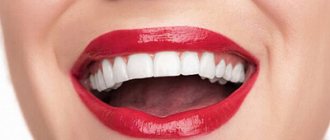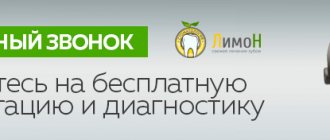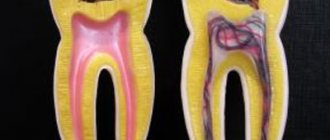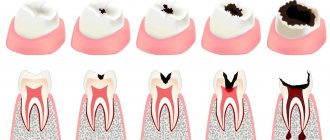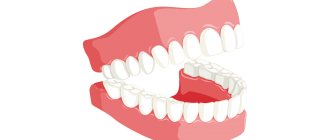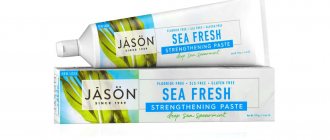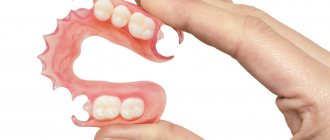The tooth hurts badly. Each of us has had to deal with this unpleasant situation more than once or twice. Many regular patients of the dental clinic already independently differentiate pain due to caries from pain due to pulpitis.
If pain occurs spontaneously, intensely, and worsens at night, they will rush to the dentist the next morning, and if pain arises from external irritants and indicates the development of deep caries, they will allow themselves to postpone treatment for a couple of days. But what to do when all your teeth hurt at once? First, let's figure out why we feel toothache in the first place.
Causes of pain
Why do all my teeth hurt at the same time? There are many causes of the problem associated with damage to internal organs:
- Inflammation of the trigeminal nerve. The pathology is accompanied by a vivid clinical picture, including severe toothache. The victim feels a burning pain in the face when talking and eating. Neuralgia often develops against the background of another disease (caries, osteomyelitis, sinusitis), and not on its own. Symptoms of neuralgia can appear for a long time even after the root cause of the disorder has been completely eliminated.
- Impaired function of the temporomandibular joint. If there is a problem, the teeth hurt on one side. Pathology develops due to an incorrectly installed filling or bruxism, etc. Additionally, the disease is accompanied by joint crunching, headaches and earaches, and increased tooth sensitivity.
- Caries. The destruction of tooth enamel and dentin is accompanied by pain symptoms. More often the pain radiates to the right or left of the affected element.
- Pulpitis. It occurs due to the involvement of the nerve bundle of the tooth in the carious process. Untreated pulpitis develops into periodontitis, in which the teeth constantly hurt. Characteristic signs of periodontitis are the release of pus from the gums, enlarged lymph nodes, and a rise in temperature. It seems to a person that all his teeth hurt at the same time.
- Cyst at the root. At the initial stages, the problem is not expressed by characteristic symptoms. As the tumor grows, the soft tissue of the gums and neighboring elements are damaged. The process is accompanied by pain and can be complicated by blood infection.
- Pericoronitis (severe teething). The problem is more typical for wisdom teeth. The problem may be due to lack of space in the mouth or tight gum tissue. A hood is formed over the erupting element, under which food particles get stuck.
Advanced pericoronitis is complicated by a purulent process, accompanied by a rise in temperature, bad breath and sore teeth on the left or right
The causes of pain in all teeth are not always associated with dental diseases. The problem appears in the background:
- Cardiovascular disorders. Angina pectoris is accompanied by severe chest pain, radiating to the shoulder and lower teeth.
- Otitis. Unpleasant sensations spread to the face area, including the jaw.
- Sinusitis. Symptoms of the disease are stagnation of mucus in the sinuses, pain in the head and upper teeth. Often with the disease, an unpleasant symptom spreads to the entire dentition.
Children are most susceptible to otitis media
Additional symptoms
In dentistry, a condition in which teeth ache or ache is called hyperesthesia. In this case, there is an increase in the sensitivity of the enamel due to the action of various predisposing factors.
Additional signs of hyperesthesia:
- the appearance of characteristic pain after eating sweet, sour, cold or hot foods and drinks;
- teeth begin to ache when inhaling cold air;
- pain can spread to several teeth and the entire jaw, increases when trying to knock on the teeth;
- during a painful attack, salivation increases, it becomes difficult to talk, especially on the street, as the teeth suddenly begin to ache;
- Due to constant pain, appetite decreases; people are forced to eat only semi-liquid food, since chewing causes discomfort.
When teeth begin to ache, a person takes a forced position, tries to place warm palms on his face and have as little contact with irritating factors as possible. It is impossible to endure such pain for a long time. And in order to understand why teeth hurt and what can be done about it at home, it is necessary to understand what irritants cause hyperesthesia.
Symptoms
Pain in the teeth manifests itself differently in different patients: it can be acute and aching, torment a person constantly or periodically. Aching sensations occur more often at night, as blood flow to the face increases.
Acute dental diseases are characterized by acute, throbbing pain. Often the intensity of the symptom increases when drinking hot and cold water. In the absence of external stimuli, signs of the disease disappear abruptly. To identify the exact cause of the problem, contact a dentist.
Clinical researches
During clinical trials using a series of Asepta products, conducted in the department of periodontology of the Central Research Institute of Dentistry and Maxillofacial Surgery of Rosmedtekhnologii, Moscow, the high effectiveness of Asepta products for moderate periodontitis was proven. The use of Asepta mouth rinse turned out to be quite effective. In addition, no phenomena of mucosal irritation or brown staining of fillings were recorded. This indicates that the use of this rinse for a two-week period provides an obvious clinical effect in the absence of negative side effects.
Sources:
- Report on determining/confirming the preventive properties of commercially produced personal oral hygiene products: Asepta toothpaste used in combination with Asepta mouthwash and Asepta gum balm Head. Department of PFS Doctor of Medical Sciences Professor S.B. Ulitovsky St. Petersburg State Medical University named after Academician I.P. Pavlova. Faculty of Dentistry. Department of Preventive Dentistry.
- Clinical experience in using the Asepta series of products Fuchs Elena Ivanovna Assistant of the Department of Therapeutic and Pediatric Dentistry State Budgetary Educational Institution of Higher Professional Education Ryazan State Medical University named after Academician I.P. Pavlova of the Ministry of Health and Social Development of the Russian Federation (GBOU VPO RyazSMU Ministry of Health and Social Development of Russia)
- Clinical and laboratory assessment of the influence of domestic therapeutic and prophylactic toothpaste based on plant extracts on the condition of the oral cavity in patients with simple marginal gingivitis. Doctor of Medical Sciences, Professor Elovikova T.M.1, Candidate of Chemical Sciences, Associate Professor Ermishina E.Yu. 2, Doctor of Technical Sciences Associate Professor Belokonova N.A. 2 Department of Therapeutic Dentistry USMU1, Department of General Chemistry USMU2
First aid for a problem
It is not always possible to see a doctor at the first signs of pathology. Before visiting a specialist, you should follow some recommendations that will minimize pain:
Why do teeth hurt when you have a cold?
- Do not use the juice of plants and vegetables with an aggressive composition - celandine, beets, garlic - to treat teeth and gums.
- Do not put analgesics into carious cavities. The drugs can lead to the development of pulpitis and burns of the mucous membranes of the mouth.
- Do not carry out pain relief measures using injections into the gums. The procedure performed by an inexperienced person provokes various complications.
- Do not heat the problem area with compresses and steaming.
- Do not rinse your mouth with alcohol tinctures.
What to do if all your teeth hurt at once? Acceptable first aid actions:
- Oral administration of painkillers - Analgin, Ketorol, Ibuprofen. For pregnant women, Nurofen or Paracetamol is recommended for toothache.
- Rinse your mouth with saline or soda solution.
- Carrying out hygiene procedures using paste and brush.
- The use of painkillers for local treatment of gums - Cholisal, Kamistad, Metrogil-Denta.
Systemic and local painkillers eliminate the symptoms of diseases, but not their cause.
How is the disease diagnosed?
To find the source of the disease, diagnostics of the oral cavity is carried out in the dental office. During this process, the patient is determined to have dental diseases that can transmit pain to the alveolar nerves.
A common reason for this reaction of the body may be caries, which rapidly develops without periodic examination, as well as following the simplest rules of hygiene.
If a more complex disease, such as pulpitis, is detected, thorough treatment by a dentist is required, which can last for a long period of time. If the disease does not relate to the oral cavity, the patient is redirected to another doctor.
Diagnosis of the disease is necessary to establish an accurate diagnosis, with the help of which individual treatment will be prescribed in the future. Specialized equipment is used to determine the type of disease.
Treatment depending on the problem
Pain due to trigeminal neuralgia is relieved by a combination of antihistamines, vasodilators and anticonvulsants. On an outpatient basis, physiotherapeutic measures - physiotherapy, electrophoresis - can help you get rid of unpleasant sensations.
The affected joint is treated with local anesthetics, for example, Lidocaine gel. The drug is rubbed in with massaging movements. Its action lasts for 30 minutes. The product can be used up to 10 times a day
Among the contraindications for the use of local analgesics are: infection of the soft tissues of the treated area; arterial hypotension; severe renal and liver failure, hypersensitivity to the components of the drug. If conservative therapy does not bring results, then surgical intervention is recommended to the patient.
For dysfunction of the temporomandibular joint, a splint made of medical silicone is used. The device fixes the jaws in an anatomically correct position. The splint relaxes the chewing muscles and joints, which reduces the intensity of pain. The fixation device can be used on all patients. The joint is then treated by an orthodontist or orthopedist.
If pain in the upper teeth is associated with sinusitis, then sinus treatment is required. In this case, antibiotics, various drops and sprays are used.
If mucus in the nose occurs due to allergic reactions, then antihistamines are used for treatment. If an allergy in the oral cavity occurs due to taking medications, then to reduce the severity of unpleasant symptoms, the mouth is periodically rinsed with warm water.
Tooth pain caused by dental problems can only be eliminated with the help of a dentist. Treatment is postponed for infectious and viral diseases in acute form. Professional intervention with a weakened immune system can lead to unpleasant consequences. We are talking not only about colds, but also about rashes on the lips and in the oral cavity.
Dental treatment is contraindicated for herpes, gingivitis, stomatitis, etc.
Homeopathic treatment
Homeopathic remedies are not as effective as pharmacological drugs, but they do not have a negative effect on other systems and organs, such as the digestive tract.
If all your teeth hurt on the left or right side, the following systematic medications will help:
- Bryony. Copes with headaches that radiate to the jaw and reduces the sensitivity of teeth to external irritants.
- Coffea cruda. Used for toothache in children and inflammation of the trigeminal nerve. The plant is prescribed for twitching symptoms that are relieved by exposure to cold.
- Glonoinum. The plant has found wide use in neuralgia. Prescribed for headaches radiating to the teeth on the right side.
- Staphysagria. Effectively copes with pain in the early stages of caries, accompanied by increased sensitivity of the enamel. The remedy is used if discomfort intensifies in different parts of the jaw when inhaling air or consuming cold foods.
- Hamomilla. Used during teething in children. The medicine is also used in cases where the elements ache on one side.
Mercurius is recommended for various inflammatory processes in the oral cavity. Homeopaths prescribe a remedy for toothaches associated with sinusitis, otitis and caries
Traditional medicine
Aspen bark has a good anti-inflammatory and analgesic effect when all teeth ache. A medicine based on a herbal ingredient is prepared according to the recipe: wood shavings are poured with 500 ml of water and left to simmer for 30 minutes.
For excruciating pain, use another remedy: 1 tsp. add a few drops of vinegar and black pepper. The ingredients are thoroughly mixed and heated in a tablespoon for 1 minute. Peas are made from the resulting mixture and applied to the problem area. Folk remedies are suitable for providing first aid to the victim and for relieving unpleasant symptoms after tooth extraction.
Folk remedies that help with aching sensations throughout the jaw also include:
- rinsing with soda solution;
- calendula-based compresses;
- rinsing your mouth with sage decoction.
Preventive actions
It is easier to prevent any disease than to subsequently engage in long-term and energy-consuming treatment. This rule also applies to dentalgia. To prevent toothache, experts give the following recommendations:
- Teeth should be brushed twice a day. For this procedure, it is important to choose the right brush and paste. After each meal and whenever possible, you should rinse your mouth. Both ordinary water and special solutions are suitable for these purposes.
- We must not forget about the existence of such assistants as irrigators, dental brushes and floss. These devices allow you to reach hard-to-reach places. As a result, bacteria and plaque will not accumulate, which prevents the risk of caries.
- You need to visit the dentist every six months. This approach allows you to notice the problem at an early stage of development and immediately eliminate it. This helps to prevent complications of the pathological process later.
- You should give up bad habits. Tobacco smoke is considered the most dangerous. It can change the composition of saliva, which only further contributes to the accumulation of plaque.
- It is better to minimize the amount of overly sweet and soft foods in your diet. The thing is that sugar is a favorable environment for the life of pathogenic flora. Soft foods do not allow teeth to naturally cleanse themselves of plaque.
Dentalgia is a very common and at the same time unpleasant phenomenon. It can unbalance any person and significantly worsen the quality of his life. Dentalgia prevents you from eating and sleeping properly, working, and doing household chores. If your teeth hurt on one side, you should not self-medicate. It is necessary to seek help from a dentist as soon as possible. After identifying the cause of the pain, he will prescribe appropriate treatment or refer you for consultation to specialized specialists.
Prevention
To prevent painful sensations in the teeth, you must follow simple preventive rules:
- promptly treat inflammatory diseases of the throat, nose and ears;
- use floss (this is dental floss) and irrigators to clean your teeth;
- eat a balanced diet;
- stop smoking and drinking alcohol;
- do not put foreign objects in your mouth.
A feeling of discomfort in all teeth at once is a characteristic sign of many dangerous diseases. Why do my teeth hurt? The doctor will be able to answer the question after studying the symptoms of the problem and visually examining the patient. To prevent pathology, it is important to undergo preventive examinations on time and promptly eliminate inflammatory processes in the ENT organs.
